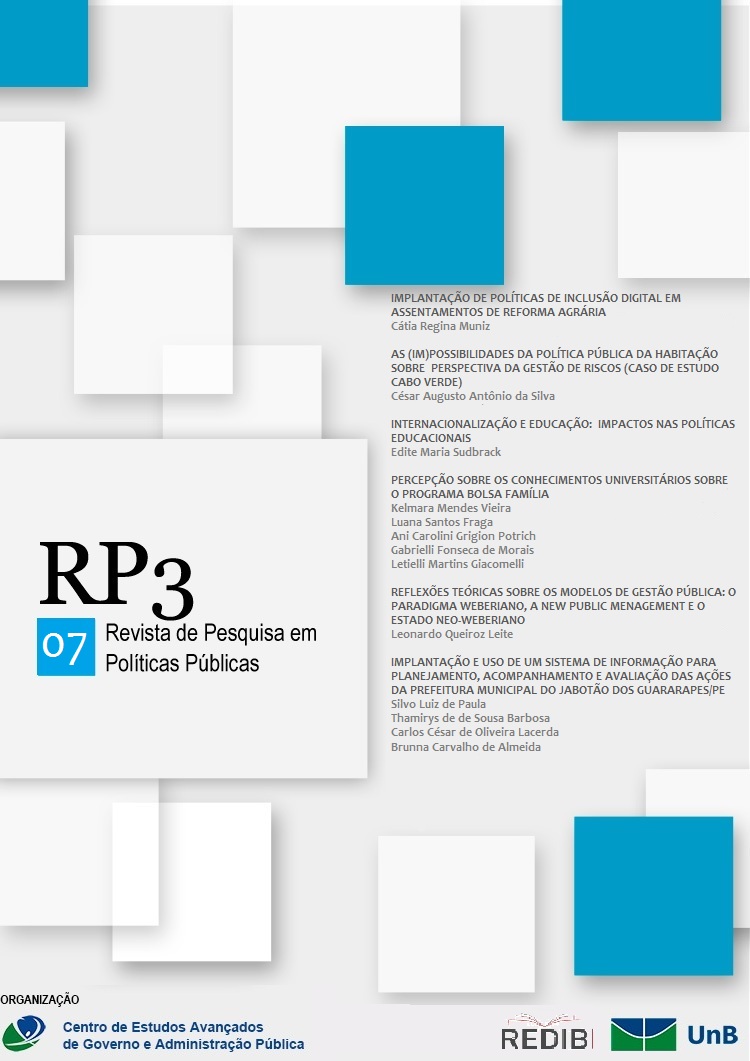Reflexões teóricas sobre modelos de Gestão Pública: o paradigma weberiano, a New Public Management e o Estado Neo-Weberiano
DOI:
https://doi.org/10.18829/rp3.v0i1.17801Keywords:
Bureaucracy. New Public Management. State. Public administration.Abstract
This work aims to discuss basic conceptual definitions for understanding the bureaucracy and its changes through
literature review that seek mainly explore the Weberian bureaucracy concepts and the New Public Management
(NPM), in addition to analyzing the implications of the so-called hybrid bureaucracy which combines the
bureaucratic forms of management with compelling values and assumptions of NPM, giving rise to the so-called
"Neo Weberian state". Emphasize the theoretical and conceptual discussion of the various forms of the dynamic
process of changing the state bureaucratic apparatus, in several different theoretical contexts, highlighting its most
salient features for each model of Public Management, seeking to synthesize the most relevant topics and hottest
topics, especially in terms that present the debate on bureaucracy and possible reformulations and adjustments.
References
ABRUCIO, F. A. Trajetória recente da gestão pública brasileira: um balanço crítico e a renovação da agenda de Reformas. Revista de Administração Pública: Rio de Janeiro. Edição Especial Comemorativa 1967-2007. p. 67-86, 2007.
BARZELAY, Michael. Breaking through bureaucracy: a new vision for managing in government. Berkeley: University of California Press, 1992.
BRESSER-PEREIRA, L. C. Construindo o Estado Republicano. Rio de Janeiro: Editora FGV, 2009.
BRUGUÉ, Quin. Modernizar la administración desde la izquierda: burocracia, nueva gestión pública y administración deliberativa. Reforma y Democracia. CLAD No. 29, Jun. 2004. Caracas.
CARNEIRO, Ricardo; MENICUCCI, Telma. Reforma do Estado e da Gestão Pública: o debate contemporâneo. Paper apresentado no 8° Encontro Anual da ABCP. Gramado, 2012.
COELHO, F. S. Reformas e Inovações na Gestão Pública no Brasil Contemporâneo. In: CARNEIRO, José Mario Brasiliense; DANTAS, Humberto (Orgs.). Parceria Social PúblicoPrivado: textos de referência. 1ª ed. São Paulo: Oficina Municipal, 2012. p. 1-37.
COSTA, Frederico Lustosa. Por uma outra reforma do Estado: estratégias alternativas ao paradigma gerencialista. Revista de Administração Pública, vol. 34, n. 1, jan/fev, 2000.
EVANS, Peter. Hybridity as an administrative strategy: combining bureaucratic capacity with market signals and deliberative democracy. Plenary Lecture at VII International Congress of CLAD on State Reform and Administrative Development. Lisbon, Portugal, October, 2002.
EVANS, Peter; RAUCH, James E. Bureaucracy and Growth: A Cross-National Analysis of the Effectiveness of ”—Weberian‘ State Structures on Economic Growth. American Sociological Review , 64, p. 748”“765, 1999.
FERLIE, E. et al. A Nova Administração Pública em ação. Brasília: Editora Universidade de Brasília: ENAP, 1999.
GERTH, H. H. e MILLS, C. Wright. Introdução. In: WEBER, Max. Ensaios de sociologia. Rio de Janeiro: Zahar, 1971.
GRUENING, G. Origin and theoretical basis of New Public Management. International Public Management Journal. 4 (2001) 1”“25.
JUNQUILHO, Gelson Silva. Nem ”•burocrata”– nem ”•novo gerente”–: o ”•caboclo”– e os desafios do Plano Diretor de Reforma do Estado no Brasil do real. Revista de Administração Pública. Rio de Janeiro 38(1): 137-56 Jan./Fev., 2004.
KUHN, Thomas S. A Estrutura das Revoluções Científicas. São Paulo: Editora Perspectiva, 1996.
LONGO, Francisco. A consolidação institucional do cargo de dirigente público. Revista do Serviço Público, 54 (2): Abr./Jun., 7-33: 2003.
LONGO, Francisco. Mérito e flexibilidade: a gestão das pessoas no setor público. São Paulo: FUNDAP, 2007.
LYNN Jr., Laurence. What is a Neo-Weberian State? Reflections on a Concept and its Implications. NISPAcee Journal of Public Administration and Policy 1 (2), 17-30. 2008.
PETERS, Guy. Still the century of bureaucracy? The roles of public servants. Public Policy and Administration. 2009, n. 30, p. 7-21.
POLLITT, Christopher; BOUCKAERT, Geert. Public Management Reform: a Comparative Analysis. Oxford: Oxford University Press, 2000.
_______. Public Management Reform: a Comparative Analysis - New Public Management, Governance, and the Neo-Weberian State. New York: Oxford University Press, 2011.
WEBER, Max. Economia e Sociedade (Vol. 1). Brasília: Editora UnB, 2003. Capítulo III.
_______. Fundamentos da organização burocrática: uma construção do tipo ideal. In: CAMPOS, Edmundo. (Org.) Sociologia da burocracia. Rio de Janeiro, Zahar: 1966.
Downloads
Published
Issue
Section
License
Copyright (c) 2016 RP3

This work is licensed under a Creative Commons Attribution-NonCommercial-NoDerivatives 4.0 International License.
Os autores de trabalhos submetidos à revista autorizam sua publicação em meio eletrônico, unicamente para fins acadêmicos, podendo ser reproduzidos desde que citada a fonte. Os mesmos atestam sua originalidade e sua autoria







